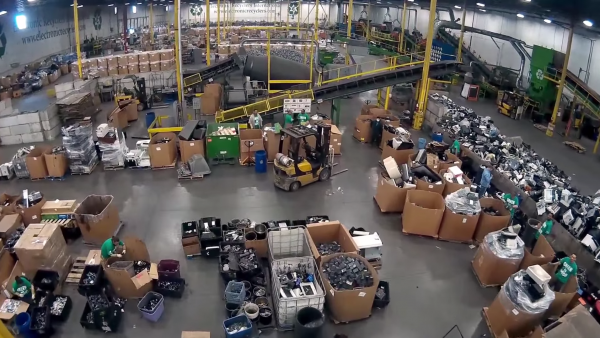
Have you spoken with your e-waste recycler lately? Do you know where your e-waste goes after collection? Is your electronic information secure even after you’ve sent your device for recycling? Chances are, there are important questions you need to ask your e-waste recycler.
Each recycler is different, with a variety of policies procedures and benefits. When sending electronics for recycling, these are important aspects of the recycling process you should definitely know about.
Where are you located?
First, it’s important to locate a suitable recycler.
Although e-waste is one of the fastest growing waste streams in the US, many people and businesses have no idea where to go or who to speak to regarding sustainable electronics recycling. Even if you are dropping your old electronics off at a local collection event or at a retail outlet like Best Buy or Staples, it’s essential to get the details about who’s handling the recycling process and how.
Getting to know your e-waste recycler is important for a number of reasons. Many industries are susceptible to fraudulent activity, and e-waste recycling is no exception. Recent reports have exposed an untrustworthy side to recycling involving electronics illegally shipped to developing countries and more.
The practice is causing huge pile-ups of e-waste in places ill-equipped to handle such large amounts of e-waste. This leads to environmental crisis, including pollution in water, soil and air – an outcome that most major recycling programs are designed to prevent.
Another unwanted outcome of e-waste recycling involves data breaches and data security. Unless the recycling process is reliably secure, there is a chance that private information could be stolen or left unprotected.
Thus, recycling is a much-needed process, but also a risky process. Before you dispose your electronics, take the time to inquire about the details. This will ensure that your electronics are recycled responsibly.
Where can I go for e-waste drop off or collection?
The variety of drop-off locations and collection events for e-waste is vast. There are retailers such as Best Buy and Staples which offer drop-off bins and collections points inside stores around the country. There are also a number of a local agencies and non-profit organizations that periodically host e-waste collection events in partnership with local recyclers.
In addition, municipalities and county governments may maintain drop-off facilities. For cities and towns with recycling services, there may be specific rules for e-waste. For instance, some curbside recycling services will not allow electronic appliances beyond a certain size or weight limit.
It’s important to remain aware and stay abreast of the specific policies and rules for e-waste drop off and collection in your area. Often, fines or further sanctions could be involved when these rules are violated. It’s equally important to be aware of any hazardous substances your electronic device may contain, such as cathode ray tubes or lithium ion batteries and dispose of these accordingly.
Ask your recycler how these important detail are addressed, and be sure to pay attention to changes or updates in policies and procedures your recycler may introduce in the future.
What protections do you have concerning data security?
This modern day query is crucial. Data security is more important than ever before even for recycled devices.
Taking the time to properly erase and render private and sensitive information unreadable is vital to the e-waste recycling process. Prior to disposing a device, users are encouraged to employ a suitable data wiping software to ensure that sensitive information is protected.
Some of the risk of post-disposal data theft can be alleviated by working with a certified and responsible recycler. This means selecting a recycler with data security measures already in place and on site. For instance, some recyclers offer data wiping services or shredding to ensure that any sensitive information within a device is rendered completely unreadable as a result of the recycling process.
A few recyclers go even further by offering clients a data security certificate guaranteeing that sensitive information is completely secure before, during and after the recycling process. Be sure to ask which data security measures are in place for recyclers in your area.
What types of certification do you have?
E-waste recycler certification is vital to ensure your electronics are disposed in an ethical and responsible manner. A lack of certification could be a good indication that your recycler is not prepared to conduct a sustainable and reliable recycling process.
A suitable recycler could be certified under a variety of programs. The most recognizable are the R2 certification and the e-Stewards certification programs. Beyond these, recyclers may obtain environmental standards recognition for their recycling processes, such as ISO certification. Choosing a certified e-waste recycler is the best way to ensure your device will be disposed according to state and federal laws and regulations.
What types of electronic devices will you accept?
Not all recyclers are equipped to handle every device on the market. It’s important to inquire which devices can be recycled in your area and to stay abreast of any changes in the types of devices accepted.
Cost may also be a factor with some devices, especially large appliances. Ask your recycler which devices can be accepted for free and which devices require a fee. The more you know about the details of acceptability and cost, the more likely you’ll be to dispose of electronic devices properly and legally.
Ask Your E-waste Recycler
Many of us don’t know about e-waste recycling unless we ask. Talking with your e-waste recycler about services, policies and procedures often uncovers relevant answers and concrete information for making the e-waste recycling process convenient and hassle-free.
Keep in mind, not all recyclers are alike. It’s crucial to choose a recycler that’s fully prepared to ensure your device and any information remaining on the device is secure and disposed in compliance with state and federal laws and regulations. Choose a reliable e-waste recycler and ask these key questions for best results.